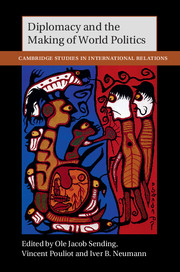Book contents
- Frontmatter
- Contents
- Contributors
- Acknowledgments
- Introduction
- Part I Making of international institutions
- 1 International law and the politics of diplomacy
- 2 Diplomacy, war, and world politics
- 3 The practice of permanent representation to international organizations
- Part II Making international cooperation
- Part III Diplomacy as a contested terrain
- Conclusion: Relationalism or why diplomats find international relations theory strange
- Bibliography
- Index
- Cambridge Studies in International Relations
1 - International law and the politics of diplomacy
from Part I - Making of international institutions
Published online by Cambridge University Press: 05 September 2015
- Frontmatter
- Contents
- Contributors
- Acknowledgments
- Introduction
- Part I Making of international institutions
- 1 International law and the politics of diplomacy
- 2 Diplomacy, war, and world politics
- 3 The practice of permanent representation to international organizations
- Part II Making international cooperation
- Part III Diplomacy as a contested terrain
- Conclusion: Relationalism or why diplomats find international relations theory strange
- Bibliography
- Index
- Cambridge Studies in International Relations
Summary
Diplomacy is the social practice by which states interact with other states. It takes place in the medium of international law as states use international law to explain and justify their policies to other states and other audiences and to understand them themselves. It is clear to see that in practice, states invoke law to strengthen their positions relative to other states by constructing justifications that situate their policies and preferences as consistent with international laws and norms. This is a ubiquitous practice in contemporary international politics. It can also be used to inform a theory of diplomacy as the intersection of international law and international politics.
This chapter advances two substantive points about diplomacy: first, that it is a social practice of states, and second, that the practice consists of reconciling state behavior with international law. The first section explains what is entailed in seeing diplomacy both as a practice and as state centric, including the dynamic between state officials and “new actors” in diplomacy such as activists, media, and non-state actors. The second section examines diplomacy's connection to compliance, contestation, and the rule of law in world politics. Diplomacy makes state behavior sensible by explaining it in terms of existing international legal forms. It is therefore productive of foreign policy and international law. The contemporary international order rests on a widely shared commitment to the international rule of law – the belief that the primary virtue of states and the main machinery of international stability depend on compliance with international law. Public diplomacy operates in the context of this commitment. States strive to be seen as acting consistently with their legal obligations, and public diplomacy is to substantiate and defend that position. In doing so, however, it is shaped by the tendency for states to see international rules as naturally consistent with their own interests and desires. As a result, competing claims about compliance are standard fare, and they cannot be resolved by recourse to either legal formalism or deliberative procedures. I end the chapter by presenting implications for the philosophy of international law, for the concepts of compliance and noncompliance, and for the agent-structure debate in international theory.
- Type
- Chapter
- Information
- Diplomacy and the Making of World Politics , pp. 31 - 54Publisher: Cambridge University PressPrint publication year: 2015
- 9
- Cited by

